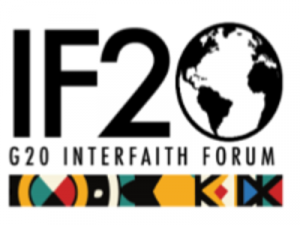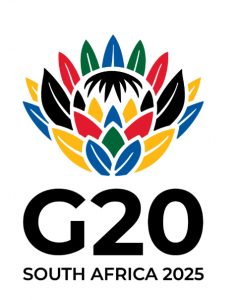Commemorating the 2025 World Interfaith Harmony Week and Welcoming the African Union as a G20 Member
May 13-14, 2025 Conference on Africa’s Faith Communities in Advancing the Sustainable Development Goals, the AU Agenda 2063 and G20 South Africa’s 2025 Process
The Inter-Religious Council of Ethiopia, the United Religions Initiative-Africa and the G20 Interfaith Forum, in partnership with the African Union - Citizens and Diaspora Directorate (CIDO) and the African Union - Economic, Social and Cultural Council (ECOSOCC), are organizing a two-day interfaith conference on the theme of “The Role of Faith Communities in Africa: Accelerating the Sustainable Development Goals (SDGs), the African Union Agenda 2063, and South Africa’s 2025 G20 Process.” The conference will take place in Addis Ababa, the headquarters of the African Union, on May 13 and 14, 2025.
Background information
For the last two years, these organizations have organized an annual interfaith conference to promote interfaith collective action in Africa aimed at fostering interfaith and intercultural harmony and peace. The organizers strongly believe in the need of promoting constructive dialogue among different faith and religious followers to enhance peaceful coexistence, mutual understanding, human dignity, social justice, development, preservation of environment and cooperation for positive change.
Conference Purpose
The organizers believe in the paramount importance of faith communities for accelerating the United Nations Sustainable Development Goals (SDGs), the AU’s Agenda 2063 and the G20 Process. Religion and its associated institutions have existed since the inception of humanity and continue to be a pervasive reality for the majority of Africans and the rest of the world. Consequently, religion significantly influences people’s thoughts and actions, thus positioning faith communities as major contributors to societal processes, including addressing contemporary challenges. Furthermore, concepts indispensable for development, such as justice, peace, and solidarity find resonance in virtually all faith traditions. Throughout history, faith actors have been actively engaged in initiatives aimed at feeding the hungry, caring for the sick, and assisting the marginalized in society. In essence, faith actors have long been involved in development endeavors, even before the term “development” itself was coined.
The African Union has a unique opportunity to shape the global agenda following its accession to the G20. With four consecutive G20 Presidencies from the Global South and South Africa set to preside in 2025, the AU is well-positioned to push for key reforms that support Africa’s development. The organizers are committed to work with the Africa Union to leverage South Africa’s 2025 G20 Presidency to advance Africa’s priorities.
The overall purpose of this interfaith conference is for faith communities in Africa to work in partnership with all stakeholders, including the AU, to accelerate development, peace-building, and to build key relationships. The organizers also anticipate that concrete and practical recommendations will be made with respect to a number of priority issues.
Media Instructions
Media Accreditation:
All journalists, photographers, and media representatives interested in covering the conference must request accreditation in advance. Please send your full name, media organization, job title, and contact details to secretariat@g20interfaith.org by May 9, 2025.
Press Kit & Briefings:
A digital press kit—including background information and the conference agenda—will be shared with all accredited media ahead of the event.
Media Access & Interviews:
Designated areas will be available for media coverage during plenary sessions and selected breakout events. Interviews with keynote speakers, AU representatives, and organizers can be arranged upon request.
Marianna Richardson
G20 Interfaith Forum
+1 202-460-9070
email us here
Visit us on social media:
Facebook
X
Legal Disclaimer:
EIN Presswire provides this news content "as is" without warranty of any kind. We do not accept any responsibility or liability for the accuracy, content, images, videos, licenses, completeness, legality, or reliability of the information contained in this article. If you have any complaints or copyright issues related to this article, kindly contact the author above.
A’qto Cycling Adds Sardinia to Its Italian Tour Collection for 2026
India Electric Vehicle Market Valuation to Reach USD 1,64,420.39 Million by 2033 - Expanding at a CAGR of 57.23%
Partner Real Estate Ranks Top 5 in California, #3 Statewide and #13 Nationally in 2025 RealTrends Report
Kalendarium
Więcej ważnych informacji
 Jedynka Newserii
Jedynka Newserii

 Jedynka Newserii
Jedynka Newserii

Ochrona środowiska

Ostateczny kształt rozszerzonej odpowiedzialności producenta wciąż pod znakiem zapytania. Przykładem dla Polski mogą być rozwiązania z Czech czy Belgii
Zgodnie z wytycznymi Unii Europejskiej do końca 2025 roku Polska powinna osiągnąć poziom recyklingu odpadów opakowaniowych na poziomie min. 65 proc. Trudno to osiągnąć bez wdrożenia systemu rozszerzonej odpowiedzialności producenta (ROP), który w świetle unijnych zaleceń powinien być zaimplementowany już w 2023 roku, a którego ostatecznego kształtu jeszcze nie znamy. Zagraniczni eksperci uważają, że Polska powinna iść w ślady Czech, Belgii i Włoch, stawiając na elastyczną organizację odpowiedzialności producenta (OOP).
Handel
Prof. G. Kołodko: Trump osiągnie efekt odwrotny od zamierzonego i spowolni rozwój Ameryki. Na wojnie handlowej z resztą świata to Stany mogą tracić najmocniej

– Liczne decyzje prezydenta Trumpa, nie tylko na polu ekonomicznym, są po prostu oparte na nieracjonalnych przesłankach, są fałszywe, są szkodliwe i dla Stanów Zjednoczonych, i dla innych, mówiąc językiem popularnym, są chore – ocenia prof. Grzegorz Kołodko, były minister finansów, i wskazuje m.in. na chaos spowodowany wprowadzaniem, zawieszaniem i przywracaniem ceł. Ekonomista w książce „Trump 2.0. Rewolucja chorego rozsądku” analizuje trumponomikę, a więc ekonomię i politykę gospodarczą pomysłu prezydenta oraz jej wpływ na gospodarkę, przestrzega przed zagrożeniami i wskazuje sposoby wyjścia z nasilającego się globalnego zamieszania. Autor ocenia też negatywnie pozaekonomiczne aspekty działalności amerykańskiego prezydenta z wyjątkiem jednego aspektu.
Farmacja
Samoleczenie generuje w UE oszczędności na poziomie 40 mld euro rocznie. Dzięki temu odciążone są europejskie systemy zdrowotne

Każdego roku Europejczycy leczą samodzielnie ok. 1,2 mld drobnych dolegliwości, w tym przeziębienie czy niestrawność. Zdaniem ekspertów wzmocnienie tych kompetencji społeczeństwa może być remedium na braki kadrowe w opiece zdrowotnej i jej deficyt budżetowy. Sięganie po leki bez recepty (OTC), suplementy diety i wyroby lecznicze pozwala uniknąć ok. 120 mln konsultacji lekarskich w skali roku, co odpowiada pracy nawet 36 tys. lekarzy pierwszego kontaktu. Samoleczenie generuje w UE oszczędności na poziomie 40 mld euro rocznie – wynika z danych przedstawionych podczas 61. konferencji AESGP, która odbyła się w Warszawie.
Partner serwisu
Szkolenia

Akademia Newserii
Akademia Newserii to projekt, w ramach którego najlepsi polscy dziennikarze biznesowi, giełdowi oraz lifestylowi, a także szkoleniowcy z wieloletnim doświadczeniem dzielą się swoją wiedzą nt. pracy z mediami.










.gif)

 |
| |
| |
|